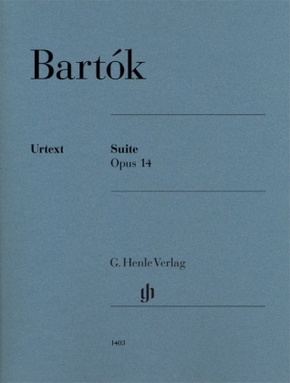Béla Bartók - Suite op. 14 - Besetzung: Klavier zu zwei Händen
| Verlag | Henle |
| Auflage | 2017 |
| Seiten | 25 |
| Format | 23,5 x 31,0 x 0,2 cm |
| Gewicht | 151 g |
| Reihe | G. Henle Urtext-Ausgabe |
| ISBN-13 | 9790201814032 |
| Bestell-Nr | 68288585BA |
_In Zusammenarbeit mit Editio Musica Budapest Zenem_kiadó
Die viersätzige Suite op. 14 entstand 1916 und zählte zeit seines Lebens zu Bartóks bevorzugten Klavierwerken. In ihr verwendete er - im Unterschied zu seinen übrigen Klavierkompositionen jener Jahre - keine Volksliedmelodien oder folkloristische Elemente. Vielmehr strebte er hier einen neuen "abstrakteren" und transparenten Klavierstil an, der auf Ornamentik und Spielfiguren verzichtet. Eine Besonderheit der Henle-Ausgabe ist der zusätzliche Andante-Satz im Anhang, der ursprünglich vor dem Scherzo stehen sollte und von Bartók erst kurz vor der Drucklegung 1918 entfernt wurde. Diese Urtextausgabe dieses bedeutenden Werks des Konzertrepertoires übernimmt den Notentext der Bartók-Gesamtausgabe. Als Herausgeber firmiert der wohl renommierteste Bartók-Forscher weltweit, László Somfai, von dem auch die ausführliche Werkeinführung und hilfreiche Hinweise zur Interpretation stammen.
Inhaltsverzeichnis:
Suite op. 14 BB 70
_Joint publishing venture with Editio Musica Budapest Zenem_kiadó
The four-movement Suite op. 14 was composed in 1916 and was one of Bartók's favourite piano works throughout his life. Unlike in his other works for piano of these years, he did not use any folksong melodies or folkloristic elements here. Instead, he endeavoured to achieve a new, more "abstract", transparent piano style that forgoes ornament and embellishment. A special feature of this Henle edition is the appendix with an additional Andante movement that was originally intended to come before the Scherzo, but which Bartók removed from the Suite only shortly before its publication in 1918. The Urtext edition of this important work in the concert repertoire follows the musical text of the Bartók Complete Edition. It has been edited by perhaps the most distinguished Bartók scholar in the world today, László Somfai, who has also written the comprehensive introduction to the work, and who offers helpful suggestions regarding its interpretation.

